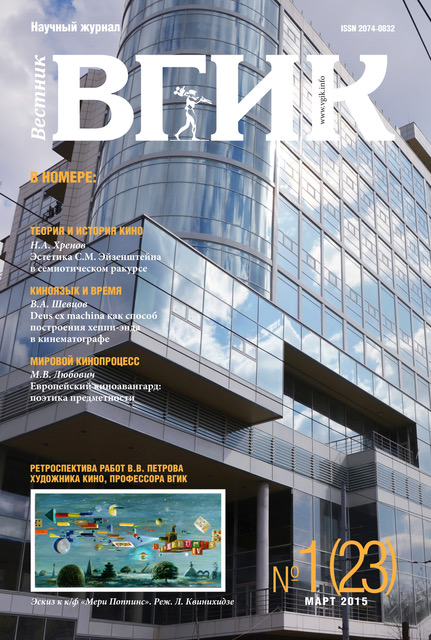“Deus ex Machina” as a Method of Constructing a Happy End in Film Art
- 作者: Shevtsov V.A.1
-
隶属关系:
- VGIK
- 期: 卷 7, 编号 1 (2015)
- 页面: 48-58
- 栏目: FILM LANGUAGE AND TIME | IMAGE GENESIS
- URL: https://journals.eco-vector.com/2074-0832/article/view/14768
- DOI: https://doi.org/10.17816/VGIK7148-58
- ID: 14768
如何引用文章
全文:
详细
The article deals with a special type of a happy ending when the final well-being is a kind of a surprise or godsend’ that is obtained through no effort of the protagonist. This type of ending deviates from the logic of the classical film narrative’ and is closer to the dramaturgical technique ‘deus ex machina‘. It is shown that the use of this technique looks justified if one of the characters of the movie is an anthropomorphic representative of some higher power.
作者简介
Vasily Shevtsov
VGIK
编辑信件的主要联系方式.
Email: editor@vestnik-vgik.com
postgraduate student of Screenwriting Department
参考
- Данелия Г. Тостуемый пьет до дна. Вторая серия // Дружба народов. - 2005, № 8. С. 9-69.
- Индик У. Психология для сценаристов. Построение конфликта в сюжете. - М.: Альпина нон-фикшн, 2014. - 348 с.
- Макки Р. История на миллион долларов: Мастер-класс для сценаристов, писателей и не только. - 3-е изд. - М.: Альпина нон-фикшн, 2011. - 456 с.
- Мариевская Н.Е. Сценарий фильма как модель динамического процесса // Вестник ВГИК. - 2014, № 20. - С. 22-34.
- Разлогов К.Э. От катарсиса к хеппи-энду: метаморфозы античности в массовой культуре // Катарсис: метаморфозы трагического сознания. - СПб.: Алетейя, 2007. - 384 с., [8] с.: ил. - С. 28-32.
- Bordwell D., Thompson К. Film Art. An Introduction. 8th Edition. - New York: McGraw Hill, 2008. - 506 p.
- MacDowell J. Happy Endings in Hollywood Cinema: Cliché, Convention and the Final Couple. - Edinburgh University Press, 2013. -218 p.
补充文件







